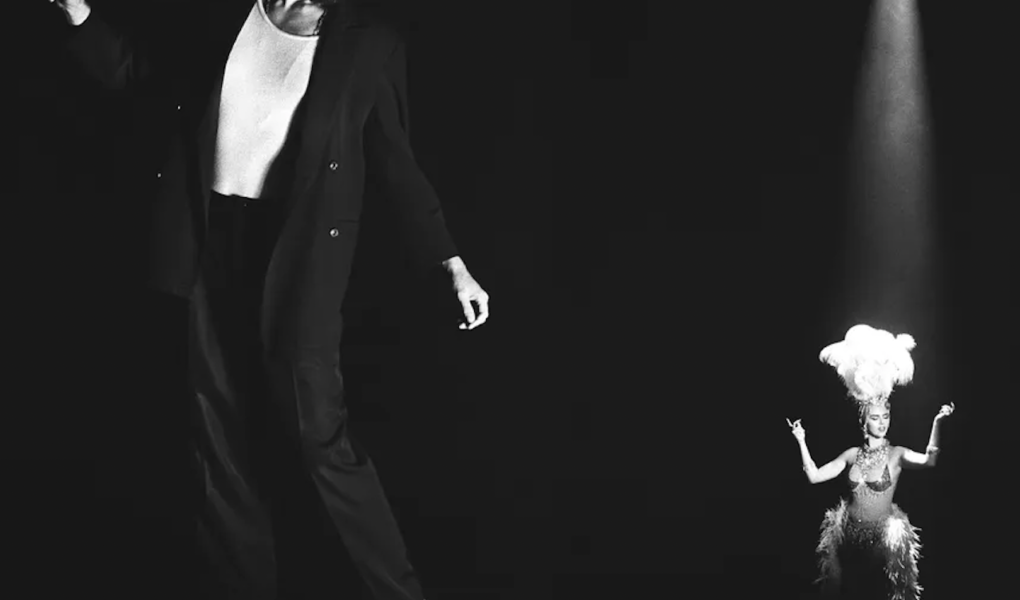Let’s play two truths and a lie: I’ve spent the last four years 1) escaping the mind-numbing clutches of American secondary education, 2) broadening my once limited knowledge about modern music, and 3) waiting for Father John Misty to resurface and release new music. The lie is the last statement – I was just shy of twelve when Misty released “I Love You, Honeybear” (2015) and fourteen when he released “Pure Comedy” (2017), and probably wasn’t mature enough to listen to songs about making love on Rorschach sheets and how the Earth is covered in garbage and pissing on flames and whatnot – and I never delved into “God’s Favorite Customer” (2018). I did, however, start listening to him two or three years ago – and truth: I have been waiting for a new album since then. Queue “Chloë and the Next 20th Century”, the release of which has considerably improved my otherwise lackluster week. Misty has delivered another triumph of an album, complete with his trademark lyrical wit, velvety voice, and somewhat questionable portrayal of women (I’m not defending him, but would his music truly be what it is without it?)
Track 1: “Chloë”
I don’t claim to be an expert on jazz (in fact, of all the popular genres of music that exist on this Earth, I’d say it’s the one I know the least about). I blame this on the fact that I only ever played string instruments, but I digress. I’m no jazz expert, but “Chloë” starts off with crooning brass that I can only describe as somewhat swing-like. Misty launches into the story of the titular Chloë, a wild bohemian-type girl who, despite being “[abhorred]” by everyone, is the object of the narrator’s affections. Chloë is a bad influence, the kind of girl that “could have dropped the cigarette on the trip [her] boyfriend’s canoe flipped” (just the first instance of me getting starry-eyed over Misty’s lyricism, and there will certainly be more to come). Misty mentions that Chloë has an “unscrupulous therapist” who has her on a flurry of medications that are at a contrast to what she truly needs, and at the end of the song, he describes how Chloë jumps off the balcony at her birthday party (presumably ending her life). This last verse is considerably slower and more deliberate than the rest of the song, showing a true portrait of the true Chloë: a depressed individual who never got the help she truly needed. The rest of the song is upbeat, masking Chloë’s sadness with syncopated brass and up-tempo piano.
Overall, Chloë is a masterful album opener, setting the tone for the rest of the album. Misty delivers a punchy Track One full of the vivid character all his characters tend to have (and of course, it couldn’t be a Misty song about a unique woman without at least one questionable lyric: this one romanticizing the fact that “her soul is a pitch black expanse”).
Track 2: “Goodbye Mr. Blue”
Somehow, “Goodbye Mr. Blue” is the most romantic song Misty has ever written (yes, even more than “I Went to The Store One Day”), and it’s about a dead cat. Misty writes an ode to the narrator’s (his?) ex-lover and their cat Mr. Blue, who passes away over the course of the song. I wasn’t expecting something so starkly sad out of this album, especially following “Chloë”, but “Goodbye Mr. Blue” certainly earns its place on the album – an earnest guitar-backed track about love and loss, much like most of Misty’s music. Misty writes a nostalgic piece about how quickly love can fade, paralleled to the story of losing the cat. He describes the “last time” he slept with his ex and claims it “came too soon”, comparing it to the “last time” he goes “down to the corner [to] buy the damn cat the expensive food”. The cat “died in [his] arms”, which ties to the last time “[he] lay [in bed] with [her]” – two instances of something precious in his arms slipping away in an instant. However, Misty implies that the ex-lover hated Mr. Blue to the point where he was the reason the relationship ended and wishes that “he’d [died] sooner” so the two of them “could’ve” been “brought… back together” – further stressing the relationship between the cat and the lover, and how the arc of his knowing them both is so intricately connected.
“Goodbye Mr. Blue” is a complex, lyrically dense song that is so much more than it seems to be. Behind the easy tune of the guitar and the gentle, almost country-like vocals, lies a strange, yet blue (could the cat be named Mr. Blue for this very reason?) song about a man, his cat, and his former love.
Track 3: “Kiss Me (I Loved You)”
To me, what makes Misty’s music so special is the fact that he doesn’t just write poetic lyrics, but he’s a powerful vocalist as well. There are only a few male vocalists that I can wholly claim have a richness to their tone in addition to a wide range, and Misty is one of those chosen few. Yet, “Kiss Me (I Loved You)” lacks that vocal strength I’ve come to expect from Misty’s music. His voice is oddly shaky at parts, either a forced vibrato that doesn’t execute well or a production choice that fell flat. The haunting nature of this song lends itself to a deep, rich tone – something Misty is fully capable of, yet doesn’t come through in this song. In my opinion, Misty delivers these lyrics with a sadness where they deserve more of a desperation (imagine the tone of Michael Bublé in “Cry me a River” or Sinatra in “My Way”, that’s what I want from this song).
However, “Kiss Me (I Loved You) still has merit. I can be nit-picky about vocals, but that doesn’t take away from the breathtakingly powerful lyricism. In fact, this song contains my favorite lyric of the entire album, which is rife with contenders for this title. “Love is much less a mystery,” says Misty, “than who you give it to”. A simple lyric that packs an indescribable punch – it’s only compounded by the haunting transition of the minor fourth to the major fifth.
Verse 1 of “Kiss Me (I Loved You)” is also lyrically dense. As the night approaches, Misty claims that the “wine’s gone to [his] head, the ferryman’s been stranded”, asking the woman to “stay with [him] tonight” even though he “swore [he] wouldn’t” ask. The ferryman could be a reference to the mythological ferryman who carried souls to the underworld, and Misty therefore proclaims that staying with him keeps the woman from venturing out of the light towards Hell. He was originally planning to let her go, but he’s gotten himself wine-drunk and can’t help but beg for her company, furthering the theme of the line between love and loss that carries through the album. Overall, a song that’s ripe with lyrics to unpack, but falls short in execution.
Track 4: “(Everything But) Her Love”
The problem with Misty’s sometimes convoluted lyricism is that sometimes I have genuinely no idea what a song is about, and “(Everything But) Her Love” is unfortunately one of those instances. After three or four passes through the song, I can guess that the song is about the narrator’s girlfriend’s ex-boyfriend who wants her back, and the narrator says he can “give [the man] everything but her love” including “sheets by the mile if the Carlyle is out of rooms”. The man is willing to accept anything from her, but Misty refuses to give it to him. Yet another instance, in my opinion, of Misty’s songs diminishing the selfhood of a woman (why is he the one who decides whether the man gets the girl or not? Should the decision not be her own? Why, in a song where she is the object of desire, does she have almost no decision-making capability)?
Sonically, I find this to be quite entertaining, with mysterious chords and an interesting piano break mid-song, but this is probably the one song on the album I won’t return to.
Track 5: “Buddy’s Rendezvous”
I love the instrumentals of “Buddy’s Rendezvous”. There’s a softness, yet a grit to the plinking piano and the occasional brass line that reminds me of the narrator, a tough guy who hangs out with the “losers and old timers”, yet still pines for his old love who has become a famous singer. The song has a desolate, apocalyptic feel to it, and Misty plays into this by peppering in words like “wasteland”, “destruction”, and “savior”. There’s a bitterness in the narrator, who believes he still has a claim on this girl who was once his (trademark Misty anti-feminism, perhaps?), but I’ll give him the benefit of the doubt and say he’s playing a character in this song. The narrator keeps asking what “happened to the girl [he] knew”, acting as if the woman doesn’t have the agency to continue living her life after her relationship ends and her career takes off.
This song ties into the running threads of past love and inconsolable grief, another character who cannot move on from someone he has loved previously. He continues to talk her up to his friends, proud of “how good [he] did” even after the relationship has come to an end. I love how brassy and rich this album is, and “Buddy’s Rendezvous” certainly contains that soulful instrumental Misty has come to be associated with.
Track 6: “Q4”
“Q4” delivers very differently than the rest of this album, with an orchestral flourish and strong percussion. It seems almost theatrical, which ties directly into the story Misty tells with the song – a struggling dramatic writer, Simone, who is deeply upset at how her work is passed over while “roses get thrown at less”. Misty writes a tragically sad song hidden behind an upbeat façade. There’s something folk-like about the music behind the chorus, like a group of performers set up at the fairgrounds telling Simone’s story with some handheld percussion and an accordion. There’s a string break in the middle that’s rich and powerful, and some of the string backing feels almost classical in nature, an element to this song that’s unique and unlike most other music released nowadays.
While I love the sound of this song, lyrically it’s not Misty’s strongest work. The chorus mostly consists of the same or similar lines repeated over and over, and the story is told simply without anything too prosaic or beautiful. I do appreciate the simplicity of the lyrics, but it’s not on-brand for Misty, and therefore took me by surprise. I do always love a song centered about a unique and well-built character, and “Q4” accomplishes just that, with a lovely instrumental and a catchy beat.
Track 7: “Olvidado (Otro Momento)”
“Olvidado (Otro Momento)” is Misty’s only song that contains lyrics in Spanish. The chorus, “Olvidalo, otro momento, olvidalo, el destino decide” translates to “Forget it, another moment, forget it, the destiny decides”. The song is upbeat in tempo and has a dance-like element to it, a piano tapping out high notes every few bars. While the beat is fun and the instrumentals carry a fun tune, I’m not the biggest fan of the chord progressions in this song – the chorus doesn’t have any kind of direct line, and while this can sometimes work to an artist’s advantage, the chorus of this song doesn’t seem to resolve nicely and the dissonance is left to hang.
“Olvidado (Otro Momento)” is unlike any song Misty has put out previously, and I appreciate the newness and freshness of it, but it feels as though he was trying for a new sound and wasn’t able to fully execute it. The production itself is well done, but something falls flat in the actual sound of the song.
Track 8: “Funny Girl”
This song has a lovely swaying beat to it, and Misty plays with time between each verse, stretching out the last few seconds in a way that left me waiting for the next beat on the edge of my seat. The musical interlude includes a lonely harp, which is unusual to hear in most modern music, but adds a few haunting runs that add to the bitter yet sad atmosphere of the song. Much like “Chloë”, Misty introduces a girl that’s “captivating” yet “manic”. She “knocks him out”, yet, he holds bitterness towards her, even stating that she’s “young but… not getting younger”, using the fact that she is aging as an insult. The titular “Funny Girl” is an entertainment industry personality, and in this industry, women lose their value and potential as they age – Misty’s offhanded remark that she’s aging is a threat concealed behind an innocent fact. Misty continues complimenting her yet simultaneously dissing her throughout the song – telling her she “[looks] unassuming” yet somehow can “fill” a room “with gut-busting laughter”, and that she “seems indifferent” but somehow “charmed the pants off Letterman”. He offers her compliments, but they all come with an angry jab hidden somewhere inside them.
“Funny Girl” is clever musically, with minor thirds that pause and then resolve to major thirds, and the song ends with a arpeggio-like flourish of the harp and a strong piano chords that parallels the way Misty describes the girl throughout the song – talking her up and putting her down at the same time.
Track 9: “Only a Fool”
Yet another song with a swingy brass introduction that’s foot-tappingly fresh, and a haunting solo violin on top of the syncopated beat, “Only a Fool” is a classic Father John Misty song. The references to religious text, the strong and catchy instrumentals, the crooning to an ex-lover, it’s all part of the Misty formula I’ve come to love over his past albums. “Chloë and The Next 20th Century” has so far been so different to the rest of his music that it’s refreshing to have one song on it that’s similar to some of his older music. I love the lyric “the wisdom of the ages… was written by smitten, lonely sages” – while religious text means something different to each person, Misty’s ‘we create our own story’ attitude is something I’ve loved through all eras of his music.
Misty takes liberty with time once again in this song, pausing deliberately between certain words and the ends of phrases to give theme extra weight. One aspect of Misty’s music I always love is his deliberate breathwork – breathing and pausing where it gives the music the most meaningful translation rather than just when he needs to breathe. Many artists do this, but Misty accomplishes it especially effectively. Misty is also a master at using the full orchestral range of instruments to their fullest extent, straying past the normal piano-percussion-guitar set up. Winds, strings, and brass all have their moment to shine in “Only a Fool” – and yet, Misty’s voice remains the star of the show.
Track 10: “We Could Be Strangers”
“We Could Be Strangers” is one of Misty’s best stories. He tells the tale of two young lovers who have their differences yet continue to find solace in each other in the nighttime – but there’s a plot twist. In their haste to reach home and make love, they get into a car crash and bleed out on the freeway, expressing their feelings for each other in their last moments alive. This song is the pinnacle of Misty’s echoes about loss and love throughout “Chloë and The Next 20thcentury” – two people on their way to falling in love that end up dying together before they get there. The two claim that they “could be strangers for one night longer”, just one more night before they truly fall for one another with no escape. They die hand in hand, grateful for the fact that they will “never get the chance” to “disappoint [each other]”.
Misty’s ability to tell a developed, haunting, meaningful story in just a few minutes is an ability that many artists never accomplish. The lyrics are simple yet carry so much meaning, my favorite being “maybe the future will look brighter undressed” – when two bodies fit well together, somehow, all the major differences between those people seem to peel and fall away. I don’t have much to say about the instrumentals of “We Could Be Strangers” – in this instance, the story and Misty’s voice itself end up stealing away my attention.
Track 11: “The Next 20th Century”
“The Next 20th Century” is one of the most incredible album-closers I’ve ever listened to, not just in Misty’s discography, but in modern music as a whole. The song opens with a foreboding percussive line that syncopates like the feeling of anxiety. Misty’s vocals are gorgeous right off the bat, and the transition from the major to the minor third, and the backing minor fourth chord in the verses create an exquisite, rich-sounding song that drips like golden honey. Misty’s imagery in this song is almost plush, traveling history “from the boondocks of Egypt to the nosebleeds at Cavalry… aviators and a black baseball hat stalking airports ‘cross the bardo quiet as a cat”. The song is seven minutes long, but every lyric has its deserved place. Misty asks who will “watch the chorus line stretching from Reno to Rome”, two cities that could not be more different in their nature. Every lyric in this song squeezes at my heart with unfamiliarity and dread, yet a beautiful tranquility. Misty goes from referencing anciencies to modernity like “Batman” and “student debtors”.
The song is an ode to history and yet an outcry at the injustices of the past, but somehow ends on a note of romance and hope. “If this century’s here to stay,” Misty says, “I’ll take the love songs and the great distance that they came”. A love letter to the transformation of romance over time, “The Next 20th Century” is a heart wrenching album closer that could not be more perfect for this album that deals so intricately with the ever-present passing of time and the destruction and rebirth of love over centuries.




